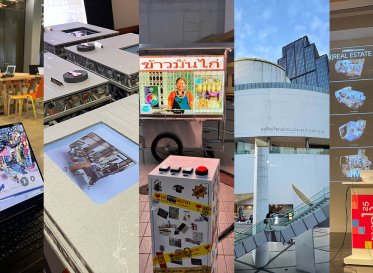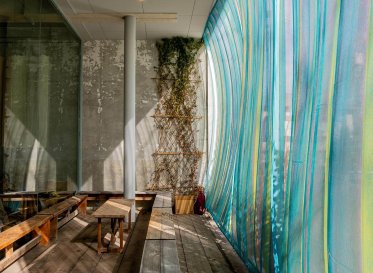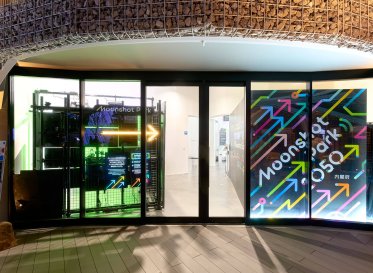Announcing the 28 Winners of the 2023 crQlr Awards – the Global Award to Design a Circular Economy

Discover the winning projects selected from a record-breaking 140 entries from 43 different countries
Loftwork Inc. (Headquarters: Shibuya-ku, Tokyo, President: Mitsuhiro Suwa) and creative community hub FabCafe Global have announced the 28 winning projects of the 2023 crQlr Awards (“Circular” Awards), a global annual award that gathers projects and ideas that seek to design a circular economy.
The crQlr Awards values are based on three guiding principles: “Circular, not linear,” “Action, not prestige” and “Gain from global perspectives.” With these values at the forefront, the awards aim to gather a wide range of circular projects, including up-and-coming ideas, activities, and artworks to large-scale initiatives working towards realizing a circular economy.
Submissions were evaluated based on the three PPP (for people, for planet, for profit) criteria. The first criterion is, for people; is the work creative, and does it show an insightful understanding of the circular economy or novel collaborative relationships? The second is for planet; does it have an overall positive and measurable impact on the environment? The third is for profit; does the work provide solutions to the challenges faced by society and businesses for activating a circular economy? Submissions were carefully assessed based on these criteria alongside the individual perspectives of the judges, resulting in a comprehensive evaluation. The selected projects will be celebrated as initiatives that can inspire people on a global scale and will be supported to continue their activities and work towards realizing a circular economy.
Expanding globally with each edition, the crQlr Awards’ third edition in 2023 attracted 140 submissions from a record-breaking 43 countries.
This year’s judging panel consisted of ten professionals, each with expertise in diverse fields such as design, AI, art, mobility, architecture, community, technology, and bioengineering. The panel included returning judge Guillaume Charny-Brunet, co-founder of Denmark’s innovation lab SPACE10, as well as Hiroshi Irie, Manager of the Digital Business Unit at the Innovation Strategy Division of East Japan Railway Company, and Japanese architect Yuri Naruse. Together with two representatives from the FabCafe Global team, the panel carefully curated and selected circular ideas and projects from perspectives based on material innovation, products and services, art, education, system design, and city planning.
The awarded projects will each receive unique prizes and comments from the judging panel, along with an official certification logo issued by the organizing committee.
In March 2024, the crQlr Exhibition & Summit 2024 will be held at FabCafe Tokyo to showcase the winning projects. The event will feature exhibitions, cross-talk sessions with winners and judges, and other programs that aim to make circular design more accessible.
More details will be announced on the official website in early February 2024.
Official Results Announcement
crQlr Awards 2023
Application Period: September 19, 2023 – November 13, 2023
Total Number of Applications: 140 projects / 43 countries
Awards: 28 Projects
Special Awards: 3 Projects
*Circular design refers to the design of products and services with the aim of achieving a circular economy. This includes the design of systems.
Comment from crQlr Awards Chairman Kelsie Stewart, FabCafe CCO and Sustainability Executive at Loftwork

As the chairman of the crQlr Awards, I’m thrilled to witness the diversity of applicants and the quality of projects in this year’s submissions. The value chain in the circular economy is both long and complex, largely as a result of economic rationality. That is why this year, I was excited to see an increase in projects that go beyond connecting the values in the “front” and “back” of the supply chain by challenging established social and business norms.
In this year’s submissions, I was inspired by both the “soft” and “hard” approaches which were expressed through the lens of this year’s Special Prize theme, “New Relationship Design”. On the one hand, we saw artists who move their audience to deeply question our relationship to waste materials, sometimes with our human bodies as the new recycling machine. On the other hand, the quickly approaching and high-potential opportunities in the new “internet of waste” points to a hopeful future where technology can be better leveraged for creating well-designed and scalable closed loop systems. Both types of projects encourage and even reward various stakeholders, including the general public, to lean in, and discover new potential along the entire value chain.
Looking ahead, the future of the crQlr Awards appears promising, building upon the momentum generated by the impactful projects of 2021 and 2022. This year, I am especially excited to bring our community closer in a more tangible way through the Circular Summit, which will be hosted offline in FabCafe Tokyo, Barcelona, and Bangkok. I invite you to join us, have a coffee, and witness for yourself the strength of circular design for our shared future.
Click here for the full commentary
About the Judges
The jury included Guillaume Charny-Brunet, co-founder of the Danish innovation lab SPACE10, who participated in the crQlr Awards this year for the second time. Also joining as Judges were Hiroshi Irie, Manager at the East Japan Railway Company in the Innovation Strategy Division’s Digital Business Unit, and Yuri Naruse, a Japanese architect and founder of NARUSE・INOKUMA ARCHITECTS Co., Ltd. All Judges are professionals with proven track records in diverse fields such as innovation, design, AI, art, mobility, architecture, community, technology, and biotechnology.
Judges

About the Certification Logo

In addition to receiving a unique prize name and comments from the judges, winning entries have also been presented with a certification logo produced by the organizing committee. These can be used as public relations tools in press releases, websites, and other forms of communications to publicize their initiatives more widely.
Comment from FabCafe Global Prize Judge Kousuke Kinoshita, Marketing & Production at MTRL/FabCafe Kyoto

First of all, I’d like to express my deepest gratitude to all of the applicants and everyone involved in these projects, along with the judges themselves. The crQlr Awards 2023 witnessed so many ideas to tackle the issue of waste, not to mention some impressive projects that focus on our environmental infrastructure of air, water, and soil. It’s worth highlighting that many are also making their processes transparent and getting ordinary people involved.
The Special Prize this year is awarded to three projects that meet the following criteria: Contributing Value to the Local Community, Positive Impact on Biodiversity, and Designing New Partnerships.
The first winner is Sea Vegetable Circulation for bringing new value to seaweed, a mainstay of Japanese food culture, while attempting to combine both sustainable industry and regeneration of the marine environment. The second winner is REWOOD for implementing a circular mechanism utilizing forestry resources that acts as a driver of local economic activity and leads to technology transfer and job creation. The third winner is Guilty Flavours for posing questions that alter our fixed ideas about waste and reminding us that ecosystems will have to coexist with man-made materials for a long time to come.
It can be said that all three Special Prize winners are aiming not just to solve immediate problems but also to design a society that can sustain itself for 100 or even 1000 years by building new types of relationships that go beyond today’s conventional industrial frameworks.
Introducing the three winners of the FabCafe Global Special Prize
For the complete list of award-winning projects, please click on the link below.
Project name: Guilty Flavours

Project Summary:
Guilty Flavours is a radical proposal for how humans can harness our own bodies as machines to eliminate plastic forever – by eating it. New biochemical processes like digestion enzymes could allow humans to safely consume plastic. Starting with vanillin, the molecule of vanilla flavour, this research project explores how we can realistically harness this process to create fully edible molecules transformed by living organisms. The result is the Guilty Flavor ice cream – the first real sample of food ever made containing an ingredient transformed from plastic waste.

Judge: Darlene Damm
Comment: We live on the cusp of using biotechnology to rebuild and redesign our world. While this holds great promise for solving environmental and social challenges, it also raises new questions. What is natural and unnatural? What is biological and what is material? What is healthy and unhealthy? What are the consequences of changing things? What are the consequences of not changing things? How much risk should we take? How much risk should we ask others to take? How do we not fear a future very different than our past? This project gently introduced these questions to the viewer. While much of the world engages in polarizing and destructive debate around technology and ethics, this project shows there is another way. We can experience and see possibilities for change and our future, while also remaining completely safe. I hope Eleonora will create other projects at the intersection of technology and ethics that allows more people to gently and safely explore the choices of our future.
Also awarded by:
- Sachiko Hirosue
- Yuri Naruse
- David Tena Vicente
Project name: Sea Vegetable Circulation

Project Summary:
Our company, Sea Vegetable, researches seaweed, which has been decreasing due to coastal burning. We aim to bring renewed interest to seaweed through environmentally friendly land-based and sea-based cultivation methods while proposing new ways of eating seaweed. Although plants traditionally cultivated on land have been thoroughly studied, with many cultivation techniques and cooking methods well-established, the world of seaweed is still in its infancy. We seek to preserve the seaweed-eating culture passed down from our ancestors while simultaneously creating a new culture around how we eat seaweed. Through our business, we strive for a brighter future for both the sea and people.

Judge: Guillaume Charny-Brunet
Comment: The holistic approach of the Sea Vegetable Company commands both admiration and praise. By developing unique technology and know-how for land-based cultivation of seaweed, the company is able to ensure steady production and foster a natural repopulation of delicious species that are otherwise threatened by rising sea temperatures and changes in their natural habitat. By bringing together a great variety of people, from scientists to fishermen, local elders, and chefs, the Sea Vegetable Company is creating a productive, inspiring and restorative ecosystem that will benefit both biodiversity and local communities, but also stimulate creativity and taste buds far beyond. Finally, it is their great sense of aesthetics and ability to share their stories and recipes that make it contagious. For all this, and for all that is coming next, the Sea Vegetable Company deserves a Big Blue Loop Prize.
Also awarded by:
- Darlene Damm
- Lucy Lu
- Irie Hiroshi
- Yuri Naruse
- David Tena Vicente
Project name: Forest Circulation Forestry Revitalization

Project Summary:
After analyzing the overall forestry industry chain in Taiwan, the team discovered that the utilization rate of domestic timber is only 1%. Following visits to public sectors and schools, it was revealed that even though every year there is over 10 million tons of wood waste resulting from human pruning and natural winds, the wood is either sent directly to incinerators or processed inefficiently. In response, the team took on the role of bridging communication between various institutions and reconsidered how wood could be utilized based on the 7R zero-waste principle. The team then decided to establish the “REWOOD Forest Recycling Hukou Creation” system, designed to pass on the technology to the next generation of workstations, aiming to build a self-sufficient and complete forestry industry chain in Taiwan.

Judge: Lucy Lu
Comment: There’s an inspiring story behind this project, which recognizes the hard work of past generations by continuing the charcoal industry. But not only that, it revolutionizes the industry as a whole. The project is truly ambitious, tackling problems that range from surplus bamboo production in Taiwan to domestic wood going unused and waste wood resulting from tree-pruning along roads. It proposes a comprehensive range of solutions and shows that through cooperation with different industries even tree species that are non-native to Taiwan could be put to commercially viable use in ways that resonate with the needs and livelihoods of the Taiwanese people. This technology is expected to develop and expand even more in the future.
Also awarded by:
- Aining Ouyang
Award-winning Projects
| Judge | Project |
| Guillaume Charny-Brunet (Co-founder & Director of Strategy, SPACE10) | ・Sea vegetable Circulation (Japan) ・Ananas Anam (Philippines, Spain, Bangladesh, Ivory Coast, United Kingdom) ・MATR-a circular economy mattress solution for hotels (Austria, Europe) ・DiFOLD Origami Bottle (Europe, US) ・Co-producing value-added, biodegradable plastics and additives from agricultural byproducts (US) |
| Anni Korkman (Programme Director of Helsinki Design Week & Weekly, Fiskars Village Art & Design Biennale, Luovi Productions Ltd) | ・TATAMI ReFAB PROJECT (Japan) ・Infinity Toy Box (Bulgaria) ・Dodola (Slovenia) ・Seaweed Dialogues (Iceland) ・記憶のえんぴつ Somewhere, Sometime (Japan) |
| Darlene Damm (Faculty Chair and former Vice President of Community and Impact at Singularity University) | ・Sea vegetable Circulation (Japan) ・TATAMI ReFAB PROJECT (Japan) ・Guilty Flavours (UK) ・An Enlichenment (London) ・CirculaRElectronics by VERTMONDE (Spain) |
| Lucy Lu(Director General of Cultural Affairs Bureau, Chiayi City) | ・Sea Vegetable Circulation (Japan) ・森林循環‧林業創生‧REWOOD Forest Circulation‧Forestry Revitalization‧REWOOD(RE-WOOD) (Taiwan) ・Transparent Solar Windows (US) ・Project “TSUMUGI” (Japan) ・ Creating a sustainable society. “Circular Action in daily life” (Japan) |
| Irie Hiroshi (Manager at the East Japan Railway Company in the Innovation Strategy Division, Digital Business Unit) | ・Sea vegetable Circulation (Japan) ・TATAMI ReFAB PROJECT(Japan) ・Transparent Solar Windows (US) ・Project “TSUMUGI” (Japan) ・The Mother Reef (Netherlands) |
| Aining Ouyang(REnato lab COO) | ・MATR-a circular economy mattress solution for hotels (Austria, Europe) ・re:Mix, the circular kitchen mixer for your own glass jars (Germany) ・MateRe-資源循環DXプラットフォーム / Digital Platform for Circular Economy (Japan) ・森林循環‧林業創生‧REWOOD Forest Circulation‧Forestry Revitalization‧REWOOD(RE-WOOD) (Taiwan) ・Reusable packaging bags and an operation system: comvey Share-Bag (Japan) |
| Sachiko Hirosue (President and CEO, Osaka Namari-Suzu Seirensho Co., Ltd.) | ・Guilty Flavours (UK) ・re:Mix, the circular kitchen mixer for your own glass jars (Germany) ・MateRe-資源循環DXプラットフォーム / Digital Platform for Circular Economy (Japan) ・Hair Recycle (Europe) ・Lalaloop Reusable cup system for a circular city (South Korea) |
| Yuri Naruse (Architect, Founder of NARUSE・INOKUMA ARCHITECTS Co., Ltd.) | ・Sea vegetable Circulation (Japan) ・Dodola (Slovenia) ・Guilty Flavours (UK) ・Tejiendo la calle (Spain) ・re:Mix, the circular kitchen mixer for your own glass jars (Germany) |
| Kosuke Kinoshita (Marketing and Production, FabCafe Kyoto MTRL) | ・MATR-a circular economy mattress solution for hotels (Austria, Europe) ・Dodola (Slovenia) ・One Stop Solution for Circular Electronics (Ecuador, South America) ・Bio-invasive Textile Library (UK) ・MateRe-資源循環DXプラットフォーム / Digital Platform for Circular Economy (Japan) |
| David Tena Vicente(FabCafe Barcelona CEO) | ・Sea vegetable Circulation (Japan) ・Guilty Flavours (UK) ・The Mother Reef (Netherlands) ・Briiv Air Filter (UK) ・Gravity Wave – Plastic Free Oceans (Greece, Italy, Egypt, and Spain, and also extending to the Cantabrian and Atlantic areas) |
The 2023 crQlr Awards Exhibition
From March 1st to the 24th, 2024, FabCafe Tokyo will be hosting the “crQlr Awards Exhibition.” The event will feature the exhibition of award-winning projects, as well as diverse programs such as cross-talk sessions like “crQlr Summit 2024 TOKYO” with guests including award recipients and judges, and exhibition tours titled “crQlr Awards Exhibition Tours.”
This provides a fantastic opportunity for those interested in the circular economy to interact with leading experts and other participants. Event details will be released on the official FabCafe website in early February 2024.
FabCafe Website
About the crQlr Awards
Launched as Japan’s first award in the field of circular design, the crQlr Awards aim to broaden sustainability players’ perspectives through exposure to not only practical know-how in existing industries but also to inspiring projects from all over the world. The overarching goal of the crQlr Awards is to enable companies, artists, and various professionals to make full use of their creativity in a wide range of fields toward the implementation of circular economy systems.
Award Organizers
Organizers


Media Sponsors


Powered by

For inquiries, please contact:
Loftwork PR Department: pr@loftwork.com
Next Contents








